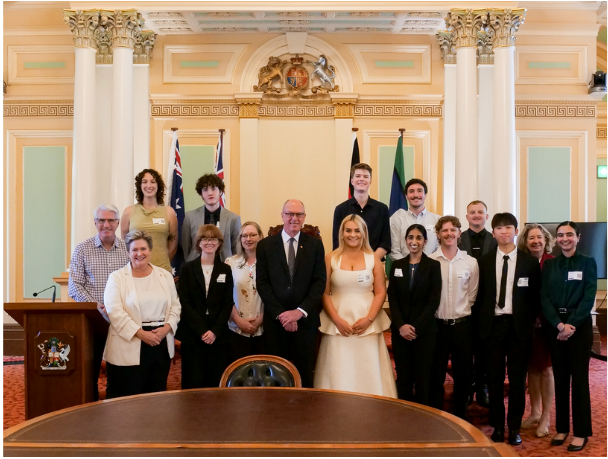-
Visit and learn
- Message from the Speaker
- About Us
- Visitors
- Visit the Public Gallery
- Visit our Gift Shop
- Have Your Say
- Get Involved
- Education and Learning
- History
- Heritage Collections
- Preservation of our Heritage
- Regional Sittings
- CPA Australia and Pacific Regional Conference
- Publications and Reports
- Speakers' Corner
- Opening of the 58th Parliament
- Parliamentary Annexe Reparation and Refurbishment
- Contact Us
Queensland Parliament Research Internship
The Queensland Parliament Research Internship provides students from selected universities with the opportunity to work with a member of parliament, or a senior officer of the parliament, to undertake a mutually agreed research project.
The program offers university students:
- first-hand experience of the relationship between political practice and theory,
- an in-depth understanding of the political processes and the role of parliament, and
- the opportunity to obtain relevant research experience in a new environment.
|
Details The internship has two components: 1. Learning Modules The modules are delivered in July and August to support students' learning about how parliamentary functions contribute to Queensland’s democracy, in preparation for the research project. There are 4 modules. Three modules are delivered online and one is delivered at Parliament House in Brisbane. One of the online modules is self-paced and the other two are delivered in real-time, each module lasting approximately 2 hours. Interns based regionally will have all of their modules delivered online. 2. Major Research Project Each intern undertakes a major research project for their parliamentary supervisor on a particular topic or issue. The topic and format of the research paper is determined at the commencement of the internship, in partnership with the parliamentary and university supervisors. The program is suitable for regional students as well as those based in Brisbane, as the majority of the program is designed for online delivery and includes a self-paced module. Timing The internship program is usually offered by the universities in Semester 2. |
|
Eligibility The program caters for third-year or fourth-year undergraduate students with a minimum GPA of high 5 or postgraduate students studying in areas such as politics, public policy, law, economics, commerce, urban development, journalism or communications. However, other areas of tertiary study are also considered for the program.
Selection Process |
|
1. Application Students complete an application form indicating their research areas of interest. Each participating university selects students to recommend for participation in the program according to their own process. University program coordinators submit a list of recommended student candidates to the Internship Program Manager, together with each student’s preferred research area/topic.
2. Project topic selection In liaison with the academic supervisors, the Internship Program Manager matches candidates with individual parliamentary supervisors, according to their proposed research areas. 3. Research design meeting An initial meeting is arranged between each student candidate, the parliamentary supervisor and the university's academic supervisor to discuss suggestions for a research topic of interest to the parliamentary supervisor. The final topic/issue for the research project may evolve from these discussions. |
|
4. Internship agreement If consensus is reached on a research project, then an agreement is drawn up outlining the aim of the project, the methodology of research, a timeline for the project and the reporting process. The agreement will also outline the undertakings made by the student candidate, the parliamentary supervisor and the academic supervisor. The agreement is signed by the parties. |
|
Assessment There are two aspects to assessment: A. Introductory program - 20% As part of the program, each intern is required to participate in a group presentation and to individually write a briefing paper. Depending on the requirements of each university, these assessment items represent 20% of the final mark. The assessments items are marked by the Internship Program Manager and moderated by a senior parliamentary officer.
B. Research project - 80% The research project is formally assessed with the evaluation forming part of the student’s academic achievements for the semester. As the project is assessed for academic accreditation, responsibility for assessment procedures and outcomes lie with the relevant university. The research project is equal to 80% of the final mark.
|
|
Contact Internship Program Manager: Rebecca Quinnell, Leader - Parliamentary Education and Liaison Telephone: (07) 3553 6416
|

